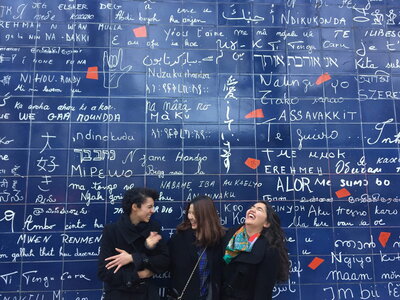

The Certificate in Intercultural Competence offers undergraduate students the chance to show future employers and potential graduate programs that they have the global and intercultural skills needed to succeed in and out of the classroom. Courses on the approved list for the Certificate include an introduction to the concept of intercultural competence, as well as elective courses that cover a wide variety of topics, from the study of ancient traditions to contemporary culture, the study of myths and fairy tales to modern literature, and more. Although the certificate will not appear on a student’s transcript, students completing the certificate should include this credential on a resume or application for advanced study.
What is intercultural competence?
Intercultural competence refers to the ability to effectively and respectfully communicate, interact, and collaborate with individuals from diverse cultural backgrounds, while navigating and appreciating cultural differences.
Why pursue a Certificate in Intercultural Competence?
This certificate serves as a vital asset to students across diverse majors, addressing the universal need for individuals equipped with intercultural skills in our globalized society. Research shows that employers and graduate programs are actively looking for graduates with these skills.
- In a recent publication of the National Association of Colleges and Employers, “global/multi-cultural fluency” was listed in the top 10 “career readiness competencies” (2020).
- Similarly, the Association of American Colleges and Universities ranks the “ability to work well in teams—especially with people different from yourself” as the number one key attribute employers look for in college graduates.
- In 2008, the Council of Europe declared intercultural education as a strategic area for the safeguard and promotion of democratic values, human rights, and the rule of law (“Living as Equals in Dignity").
Who can earn the certificate?
The certificate is designed for undergraduate students from a broad range of majors across colleges, acknowledging that intercultural competence is a valuable asset in every field. Any undergraduate student can pursue the certificate, providing flexibility for those who wish to enhance their intercultural competence regardless of their major. While there is no major restriction, students pursuing majors with strong ties to community and global engagement may find the certificate particularly relevant to their goals.
Certificate Requirements
For completion of the Certificate in Intercultural Competence, students must complete the core course, SLCL 110: Intro to Intercultural Competence, as well as nine credit hours from the list of Elective Requirements. Of those electives, students must choose courses from at least three different rubrics (the letter code associated with each course; some departments have more than one rubric).
No course substitutions will be approved.
All courses applied to this certificate may also be counted toward the requirements of the student’s declared major or minor.
Core Requirement
- SLCL 110: Intro to Intercultural Competence (3 hours)
Elective Requirements
9 credit hours; students must choose courses from at least 3 different rubrics
Bosnian-Croatian-Serbian
- BCS 115: South Slavic Cultures
Classical Civilization
- CLCV 114: Introduction to Ancient Greek Culture
- CLCV 115: Mythology of Greece and Rome
- CLCV 116: Introduction to Ancient Roman Culture
- CLCV 120: The Classical Tradition
- CLCV 224: American Race and Ethnicity in the Classical Tradition
Comparative & World Literature
- CWL 114: Global consciousness and Literature
- CWL 189: Literatures of the Islamic World
- CWL 208: Cultures & Literatures of South Asia
- CWL 209: Jewish American and US Minority Literatures in Dialogue
- CWL 242: Modern Masterpieces of Western Culture
East Asian Languages & Cultures
- EALC 222: Chinese Thought and Culture
- EALC 230: Popular Cultures of Contemporary East Asia
- EALC 250: Intro to Japanese Culture
- EALC 365: Contemporary Korean Society
- EALC 369: Hanguk Hip Hop
French
- FR 319: Francophone Worlds
- FR 335: French Cultural History to 1789
- FR 336: French Cultural History 1789 - 1968
- FR 337: Contemporary France
- FR 212: Intro to Cultural Analysis
German
- GER 201: German Popular Culture
- GER 205: Germany and Europe
- GER 251: Grimm's Fairy Tales in Context
- GER 261: The Holocaust in Context
- GER 494: German Postwar and Contemporary Cinema
Linguistics
- LING 115: Language and Culture in India
- LING 222: Language in Globalization
- LING 250: American Voices: Linguistic Diversity in the US
Polish
- POL 115: Intro to Polish Culture
Portuguese
- PORT 150: Writing Brazilians into the U.S.
- PORT 404: Cultures of the Lusophone World
Religion
- REL 110: World Religions
- REL 134: Religion, Race, and Resistance
- REL 214: Introduction to Islam
- REL 286: Introduction to Hinduism
Russian
- RUSS 115: Intro to Russian Culture
- RUSS 225: Russian Lit and Revolution
Scandinavian
- SCAN 215: Madness, Myth, and Murder
- SCAN 225: Vikings to Volvos: Scandinavia
- SCAN 251: Viking Mythology
- SCAN 252: Viking Sagas in Translation
Spanish
- SPAN 232: Spanish in the Community
- SPAN 254: Approaches to Culture
- SPAN 312: Modern Spanish Literatures and Cultures
- SPAN 326: Latin America Cultural Studies II
- SPAN 324: Latin America Cultural Studies I
Translation Studies
- TRST 201: Intro to Translation Studies
- TRST 412: Spanish/English Translation
Ukrainian
- UKR 113: Intro to Ukrainian Culture
Requesting the Certificate
Information on how to request a copy of the certificate will be posted soon.
Intercultural Competence Certificate Contacts
The certificate is administered by the School of Literatures, Cultures & Linguistics. Contact the Intercultural Competence Certificate advisor or the assistant to the director for more information.
- Intercultural Competence Certificate advisor: Zach Reed
- Assistant to the director: Marcia Bellafiore